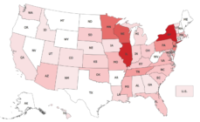 The Wet Mountain Tribune in December settled its slam-dunk federal lawsuit against the Custer County Board of Commissioner (BOCC) and will once again run the county’s public notices. The lawsuit claimed the BOCC violated the Tribune’s First Amendment rights by retaliating against it by awarding the county’s public notice contract to another local newspaper that is openly partisan.
The Wet Mountain Tribune in December settled its slam-dunk federal lawsuit against the Custer County Board of Commissioner (BOCC) and will once again run the county’s public notices. The lawsuit claimed the BOCC violated the Tribune’s First Amendment rights by retaliating against it by awarding the county’s public notice contract to another local newspaper that is openly partisan.
In addition to making the Tribune the county’s official newspaper again for the next four years, Custer County also agreed to pay the Tribune $50,000. That’s about three times as much as the county spends annually on its notices, according to Tribune owner Jordan Hedberg’s (photo above) estimate.
Colorado paper files slam-dunk lawsuit over lost notices
 The Wet Mountain Tribune filed a federal lawsuit last month accusing the local Board of County Commissioners (BOCC) of punishing it by awarding Custer County’s public notice contract to another newspaper. The lawsuit alleges the BOCC violated the Tribune’s First Amendment rights by retaliating against it for reporting factual matters the Board would have preferred to keep hidden.
The Wet Mountain Tribune filed a federal lawsuit last month accusing the local Board of County Commissioners (BOCC) of punishing it by awarding Custer County’s public notice contract to another newspaper. The lawsuit alleges the BOCC violated the Tribune’s First Amendment rights by retaliating against it for reporting factual matters the Board would have preferred to keep hidden.
The paper appears to have a very strong case.
Governor calls newspaper notice requirement ‘stupid’
 Colorado Gov. Jared Polis (D) clearly appreciates good journalism and supports a free and independent press. But it’s also clear he hasn’t thought very deeply about public notice and he is too confident of his understanding of the issue.
Colorado Gov. Jared Polis (D) clearly appreciates good journalism and supports a free and independent press. But it’s also clear he hasn’t thought very deeply about public notice and he is too confident of his understanding of the issue.
We base that judgment on extemporaneous remarks Colorado’s chief executive made during an April 17 press conference on the state’s response to COVID-19.
With about 15 minutes remaining in the press conference, Denver Post reporter Alex Burness asked the governor for his thoughts on the impact of news deserts in the state and whether he believes government support or funding of the news business is appropriate.
The Year in Public Notice Legislation
 Despite a bit of early angst in a few states, 2018 ended up being a relatively benign year for public notice.
Despite a bit of early angst in a few states, 2018 ended up being a relatively benign year for public notice.
PNRC has tracked about 160 separate public notice bills this year, just a bit more than in 2017. Only 24 were enacted into law and most were vanishingly minor. As is generally the case with minor public notice legislation, almost all of the notice changes were incidental to the primary focus of the legislation. For example, a bill in New Jersey added several new instances of both newspaper and government website notice in connection with public-private partnership agreements for certain building and highway infrastructure projects.
Governor Vetoes Public Notice Bill in Colorado
 Colorado Gov. John Hickenlooper yesterday vetoed a bill that would have substantially reduced a category of newspaper notice in the state beginning in 2022.
Colorado Gov. John Hickenlooper yesterday vetoed a bill that would have substantially reduced a category of newspaper notice in the state beginning in 2022.
Senate Bill 156 would have allowed counties to publish salary reports, financial statements and monthly expense reports on their own websites in lieu of newspapers. The legislation would still have required counties to publish newspaper notices providing a website address for each report.
It’s Shaping up to Be a Good Year for Public Notice
 A great deal of bad legislation died when 15 more state legislatures adjourned in May, including bills in five states that would have removed all or large segments of public notice advertising from newspapers.
A great deal of bad legislation died when 15 more state legislatures adjourned in May, including bills in five states that would have removed all or large segments of public notice advertising from newspapers.
The most significant legislation to expire was a bill in Missouri that was close to passage and would have shifted foreclosure notices from newspapers to mortgage-trustee websites. Missouri House Bill 1651 and its Senate companion were both voted out of committee following hearings earlier this year, but neither got to the floor for a vote before the legislature packed it in for the year in mid-May.
